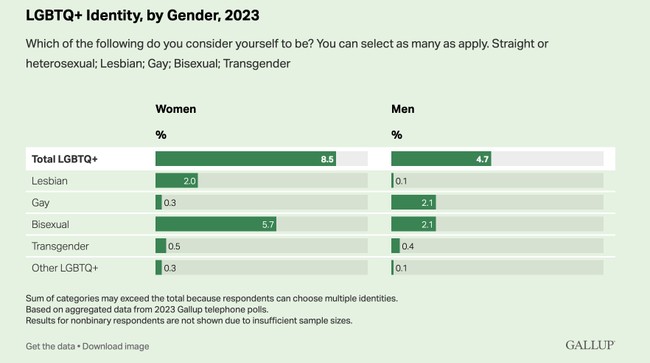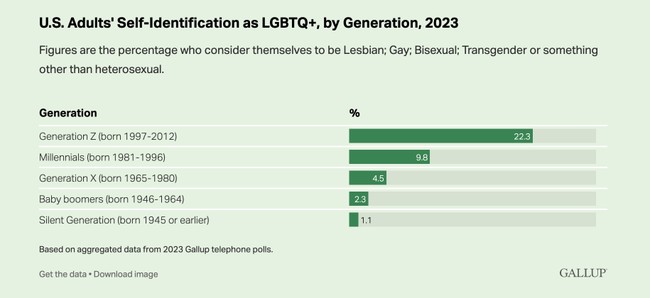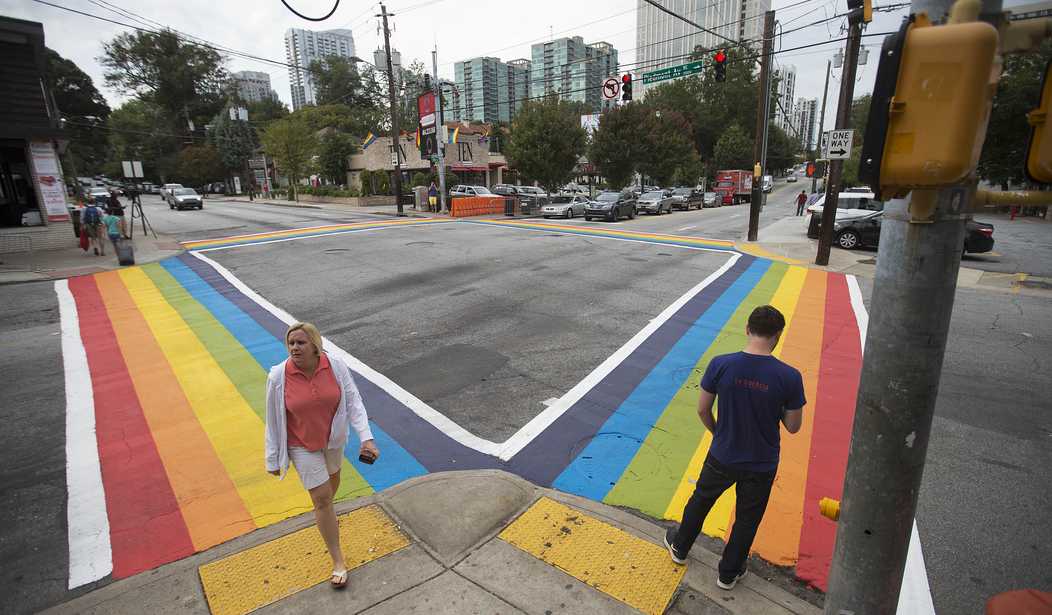I have a very difficult time believing that this is actually true, mainly because it seems to contradict evolutionary theory.
But, according to a Gallup poll, over 22% of Gen Z adults identify as LGBTQ+, and the overall proportion of all adults who do so has more than doubled since 2012. This seems implausible to me, although I do not doubt Gallup's numbers themselves.
Almost a quarter of Gen Z adults identify as LGBTQ+ https://t.co/hDaW7DlBZq
— Axios (@axios) March 13, 2024
Axios' analysis of the poll is, as is always the case with Axios, short and to the point.
7.6% of adults in the U.S. now identify as lesbian, gay, bisexual, transgender or another sexual orientation besides heterosexual, according to a Gallup survey released Wednesday.
Why it matters: That's a new record for adults who identify as LGBTQ+, a community that's grown by over four percentage points since 2012.
What's inside: The survey found that women are nearly twice as likely as men to identify as LGBTQ+.
- Bisexuality is the most common form of LGBTQ+ identification among women, while gay and bisexual are the most common among men.
- Generation Z (those born between 1997 and 2012) was by far more likely to identify as LGBTQ+ than any other generation.
Of note: Almost three in 10 (28.5%) Gen Z women identify as LGBTQ+.
- For comparison, 12.4% of millennial women and 4.7% of Generation X women identify as non-heterosexual.
- Over one in 10 (10.6%) Gen Z men identify as LGBTQ+, roughly double the percentage among millennial men (5.4%).
Weirdly, Axios thinks that the growth in the number of LGBTQ+ identifying Americans has corresponded with increasing hostility to them, which strikes me as the oddest interpretation of the past decade's attitude toward non-conforming sexual identities that one can possibly make.
The big picture: The growth of the LGBTQ+ community has coincided with an heightened acceptance of non-heterosexual orientations but also increased institutional bias against those within the community.
Institutional bias? Surely, institutions have been biased about alphabet ideology, but they are biased for it rather than against it. You can hardly walk 10 feet without encountering some institution or another slobbering over the most bizarre sexual identity or sexual practice. Schools are handing out dildos to students, for God's sake, and handing kids books on gay S&M practices.
What has been controversial is medicalizing and sterilizing confused children, and for very good reasons: doing so is outrageously dangerous and destructive. Forcing young girls to share locker rooms with men, give up their competitiveness in sports, and everything else that goes along with the alphabet movement.

There is no attempt to overturn gay marriage or throw gays out of public life; quite the opposite. What is happening is a reasonable backlash against radical anti-woman policies.
The rapid expansion in the percentage of LGBTQ+ identifying people is, in fact, likely a response to the institutional celebration of and encouragement of identifying as Queer. Young people are rewarded for doing so, lavished with praise, and given carte blanche to behave in the most absurd and offensive ways conceivable. Straight White males are savaged at every turn, but a transgender lesbian can spit in the face of anybody and be celebrated.

The incentive to identify as LGBTQ+ is so great that one has to wonder how many self-identified Queers actually practice alternative sexuality or simply assert it. Is there a massive shift in sexual practices or simply an adoption of an "identity" that provides benefits?
I am open, though, to the possibility that something other than social incentives might be at work. There is massive evidence of the decline in fertility in the Western world, and at least some of that has to do with the reduction in actual sperm counts. Perhaps there is some environmental variable at work that has caused this?
We do know that there are man-made endocrine disrupters in the environment. Could we have accidentally changed the hormonal balances of people, contributing to a change in sexual identities?
That is pure speculation, of course. What isn't, though, is the massive shift in birth rates, sexual identification, and social norms. There are likely multiple variables at work, but if we want civilization to survive, we need to find out what is at work.
It is a truism that shrinking societies are dying societies. There have, it seems, always been gays since written records began. The existence of homosexuality is not, per se, incompatible with a growing and vibrant population.
But not at levels like this. We have seen an explosion in antinatalism and the movement toward sexual activity completely divorced from reproduction. It isn't easy to see how this ends well.








Join the conversation as a VIP Member